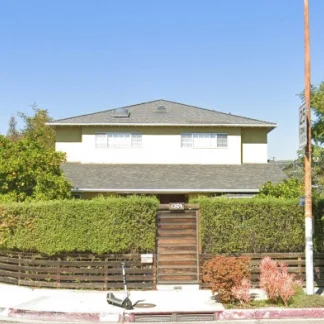Synergy Sober House
Synergy Sober House is a private rehab located in Los Angeles, California. Syner...
Casa Vista Sober Living, located in Los Angeles, California, provides sober living accommodations to individuals currently in recovery from addiction. They are not a traditional alcohol and drug rehab treatment center, but instead provide a safe environment where individuals can engage in their treatment program while being supported.
Casa Vista Sober Living only allows eleven people to live on site at a time to ensure each person receives the guidance they need. The sober living home offers mentoring, coaching sessions, outdoor recreational activities, peer support services, drug testing, goal setting, access to 12-Step meetings, necessary transportation services, and around-the-clock supervision. Individuals must follow the house rules and maintain sobriety while living on site.
Casa Vista Sober Living accepts most major medical insurance plans, including Amerigroup, Aetna, Anthem, Blue Cross Blue Shield, United Healthcare, Cigna, Kaiser, Magellan, and HCSC. Out of network benefits may vary, so it is important for individuals to verify their coverage prior to starting treatment.
Contact us for more information: (310) 913-1698

Connect with Casa Vista Sober Living by calling their admissions team directly.
(310) 913-1698 Website Get DirectionsExperiential therapy is a form of therapy in which clients are encouraged to surface and work through subconscious issues by engaging in real-time experiences. Experiential therapy departs from traditional talk therapy by involving the body, and having clients engage in activities, movements, and physical and emotional expression. This can involve role-play or using props (which can include other people). Experiential therapy can help people process trauma, memories, and emotion quickly, deeply, and in a lasting fashion, leading to substantial and impactful healing.
Group therapy is any therapeutic work that happens in a group (not one-on-one). There are a number of different group therapy modalities, including support groups, experiential therapy, psycho-education, and more. Group therapy involves treatment as well as processing interaction between group members.
Life skills trainings involve all the skills a person must have in order to function successfully in the world. These include time management, career guidance, money management, and effective communication. Truly successful addiction recovery is based on the ability to not only live substance-free, but to thrive. Life skills teaches the practical necessities of functioning in society, which sets clients up for success in life, and therefore sobriety.
Recreational therapy (aka therapeutic recreation) uses creative and fun activities to help with addiction recovery. Recreational therapists lead patients in entertaining and engaging activities like sports or games; art (drawing, painting, sculpture); drama, music, and dance; and/or community outings (field trips) to improve patients' physical, social, and emotional well-being.
Group therapy is any therapeutic work that happens in a group (not one-on-one). There are a number of different group therapy modalities, including support groups, experiential therapy, psycho-education, and more. Group therapy involves treatment as well as processing interaction between group members.
Life skills trainings involve all the skills a person must have in order to function successfully in the world. These include time management, career guidance, money management, and effective communication. Truly successful addiction recovery is based on the ability to not only live substance-free, but to thrive. Life skills teaches the practical necessities of functioning in society, which sets clients up for success in life, and therefore sobriety.
Recreational therapy (aka therapeutic recreation) uses creative and fun activities to help with addiction recovery. Recreational therapists lead patients in entertaining and engaging activities like sports or games; art (drawing, painting, sculpture); drama, music, and dance; and/or community outings (field trips) to improve patients' physical, social, and emotional well-being.
Life skills trainings involve all the skills a person must have in order to function successfully in the world. These include time management, career guidance, money management, and effective communication. Truly successful addiction recovery is based on the ability to not only live substance-free, but to thrive. Life skills teaches the practical necessities of functioning in society, which sets clients up for success in life, and therefore sobriety.
Recreational therapy (aka therapeutic recreation) uses creative and fun activities to help with addiction recovery. Recreational therapists lead patients in entertaining and engaging activities like sports or games; art (drawing, painting, sculpture); drama, music, and dance; and/or community outings (field trips) to improve patients' physical, social, and emotional well-being.
Recreational therapy (aka therapeutic recreation) uses creative and fun activities to help with addiction recovery. Recreational therapists lead patients in entertaining and engaging activities like sports or games; art (drawing, painting, sculpture); drama, music, and dance; and/or community outings (field trips) to improve patients' physical, social, and emotional well-being.
Synergy Sober House is a private rehab located in Los Angeles, California. Syner...
Profound Treatment, located in Woodland Hills, California, offers medical detox ...
Sovereign Health provides mental health and substance abuse services for adults ...
American Private Physician Association is a private rehab located in Santa Monic...